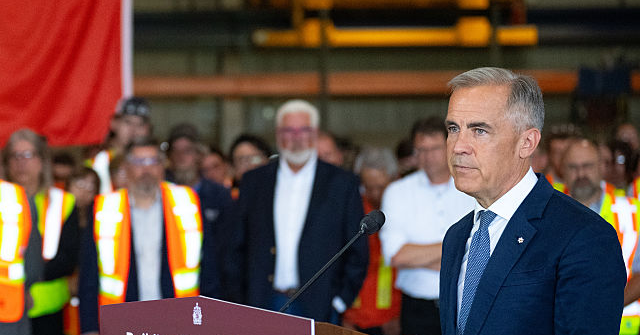Leftist Canadian Prime Minister Mark Carney announced during a stop at a steel company on Wednesday that he would impose higher tariffs on non-U.S. steel imports to protect the Canadian steel industry from foreign competition.
China is the second largest importer of steel to Canada, according to Global News, and has been subject to similar tariffs and other trade restrictions around the world in response to a practice known as “dumping” in which a country overproduces a certain good and imports a large amount of it into a foreign country to lower prices and hurt that country’s domestic industry.
In addition to Canada, Vietnam and India have announced anti-dumping tariffs on Chinese steel this year.
Carney explained that the new policy was necessary not just to protect Canadian steel manufacturers from foreign competition, but to protect the Canadian economy generally as Ottawa attempts to broker a new trade agreement with the United States. President Donald Trump announced a global overhaul of American trade policy in April that would require every nation seeking a place in the American marketplace to renegotiate its agreements on terms more favorable to Americans. Trump instituted a deadline of August 1 for negotiations with Canada, after which Canadian goods would face a 35 percent tariff entering the United States if not covered by the United States-Mexico-Canada Agreement (USMCA).
The new steel policy is not directly related to negotiations with the White House but will likely inform the terms of any agreement.
“Imports supply almost two-thirds of current Canadian consumption of steel, compared to less than one-third for the United States and less than one-sixth for the European Union,” Carney noted in his visit to the steel factor in Hamilton, Ontario. “Over time, we’ve become too dependent on the United States as our biggest customer with more than 90 per cent of our steel exports going south of the border.”
The prime minister’s office explained in a press statement that, while the new tariff policy would include “no changes to our current trade measures with the U.S.,” it would make it more expensive for other countries to import steel into Canada.
“First, Canada will tighten the tariff rate quota levels for steel products from non-FTA countries from 100% to 50% of 2024 volumes. Above those levels, a 50% tariff will apply,” the statement explained. “Canada will also implement additional tariffs of 25% on steel imports from all non-U.S. countries containing steel melted and poured in China before the end of July.”
The new tariffs would be increased for free trade partners as well, but in a more limited manner: “Canada will introduce a tariff rate quota level for steel products at 100% of 2024 volumes and apply a 50% tariff on steel imports above those levels.”
The Canadian government announced it would also dramatically increase state investment in training and developing domestic talent in the steel industry.
The policies are expected to take place at the end of July.
Global News quoted Carney as stating that the Trump policies on trade informed the changes. “The trade actions of the United States are further transforming global steel market dynamics and supply chains,” Carney reportedly explained. “Let’s be clear, Canada will be one of the countries most impacted by these developments.
“Moving forward, we must diversify our trade relationships and above all, we must rely more on Canadian steel for Canadian projects and those shifts start today in an increasingly unpredictable and unreliable world,” he concluded.
He specified that the reason the tariffs are affecting third-party countries and not America directly is because those countries will also face higher tariffs in America, prompting them to seek other markets, which may result in an oversupply of steel in Canada if it does not protect itself from dumping.
“One of the consequences of those very high tariffs is it pushes product, steel in this case, and their derivatives into a Canadian market that has historically been quite open,” Carney said. “So it’s important that we protect our market from those secondary effects, if you will, from the U.S. negotiations.”
Carney, who has deep ties to the Chinese government and engaged in a friendly visit to Beijing shortly before being appointed prime minister, did not name China in particular despite its position as one of the world’s most formidable steel producers. The Chinese Communist Party has faced similar action from other states, however, including the fellow communist nation of Vietnam, which imposed tariffs on Chinese and South Korean steel in April.
The Vietnamese Trade Ministry announced a temporary tariff of 37.13 percent on most Chinese steel beginning on April 16 to “curb the rapid growth of imports which could cause serious harm to the domestic industry.”
Similarly, the government of India, which has one of the worst’s most protectionist international trade regimes, imposed a 12 percent tariff on some Chinese steel in late April. New Delhi notably waited to announce the tariff to coincide with a visit to the country by Vice President JD Vance. The Indian Finance Ministry described the move as a “safeguard duty” intended to protect against unfair competition.
Follow Frances Martel on Facebook and Twitter.
Read the full article here


